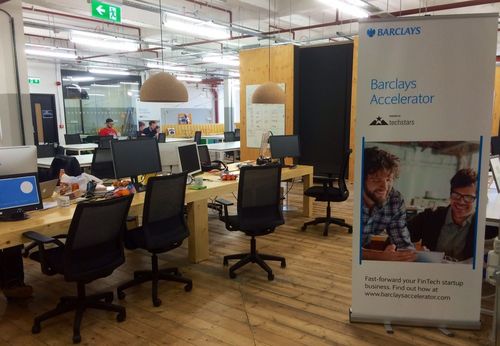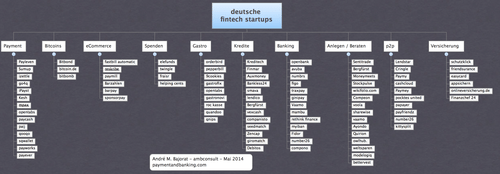
As mentioned yesterday, banks are not sleeping ostriches but are very awake to the digital revolution.
In fact, many are investing in that revolution with four incumbent banks standing out on my radar for their investments in these efforts.
The first of these is Sberbank, mainly because two friends of mine are running their venture capital fund: Mircea Mihaescu and Matteo Rizzi (Mircea is our guest at the next Financial Services Club meeting in Warsaw).
SBT Venture Capital currently has $100 million in capital but Sberbank has said it may invest a total of $700 million in subsequent venture capital funds over the next three years.
The aim of the fund, as stated on the company’s home page, is:
Managing a fin-tech fund investing in the most promising start-ups of the financial industry. We bring a solid experience in the banking industry, an incredible network of financial services companies and related technology vendors, and one of the biggest bank on the planet as our main partner. We are focusing on early-stage growth companies already generating revenue, in need for capital, brains and the right network to reach scale. Our engagement is far from being financial only. We foster growth.
Some startups may be wary of such funding but several have taken up the opportunity already, including Red Zebra Analytics and Sequent Software. They are even investing in platforms for startups, such as the Startup Bootcamp based in London.
Speaking of startup platforms, Barclays has recently launched the Barclays Accelerator, powered by Techstars.

Techstars has been around for a while, and have a clear value proposition:
Techstars provides $118,000 in seed funding, intensive mentorship, and an amazing network of mentors and alumni for 7-10% equity in your company. After 90 days with Techstars, our companies average over $2M in follow on investment and more than 35 of them have already been acquired.
The London partnership with Barclays provides even more, with a competition for ten firms to move into mentoring mode and help them achieve launch status.
The ten firms were selected from over 400 applicants and will air their offerings on 25th September at an investor’s demonstration day. The firms are selected as being those that are “passionate about digital and have some radical FinTech (financial technology for those unfamiliar) concepts that you believe could instigate a new era in financial services innovation.”
The firms selected are provided with a space to base themselves in London’s East End, provided by Barclays, whilst Techstars mentor the new firms. Barclays say they are doing this to purely observe the process. Having said that, if the startups incorporate Barclays’ Pingit APIs in their offerings, they wouldn’t complain and, from what I’ve seen, many of the finalists from the application process are based firmly with a focus upon cryptocurrencies. That means the Barclays Accelerator is very much investing in the Bitcoin space.
Interesting.
Another bank that’s investing in incubation is Commerzbank in Germany.
You may think they’re bankrupted, but bankrupt banks are investing heavily in next generation banking as that’s the only way they will survive.
So Commerz has created The Main Incubator GmbH in Frankfurt, Germany.
Like The Barclays Accelerator, The Main Incubator is focused upon supporting innovative FinTech startups, mainly in commercial banking, and provides help with help with equity, expert know-how, office space and infrastructure to grow.
According to Christian Hoppe, who leads The Main Incubator with Birgit Storz, the focus that the incubator offers ranges “from mobile payments and banking, peer-to-peer financing and crowdsourcing, new communication tools and paths, customer loyalty and user programs, process innovation both from the customer and bank side, to information extraction and processing.”
It’s not a bad move, as you may be surprised how many startups there are in Germany in this space (doubleclick image to enlarge):

Picture sourced from PaymentandBanking.com
The other bank that’s been heavily investing in future projects is BBVA.
I’ve mentioned their API competition before, and this year it's a startup competition.
The startup competition is organised by Next Bank and BBVA in collaboration.
The deadline for entries has just been extended, startups now have until 25 June to apply.
The way it works is:
- Three regional competitions: Central and South America, North America and Europe (Next Bank Bogota 4-5 Sep, Next Bank Europe in Barcelona 18-19 Sep and Next Bank Americas in Mexico City 15 - 16 October)
- Projects will fall into one of two categories: New Banking and Digital Life
- 60 finalists will be selected: 30 in New Banking and 30 in Digital Life
- Finalists will present their projects in the regional events
- During the events, the jury will choose the winners (6) and the runners-up (6)
What are the prizes?
- More than €180,000;
- The opportunity to set up a joint project with BBVA; and
- Crash Acceleration in NYC: take part in activities and meetings with experts and startup investors.
BBVA’s aim with the Open Talent Competition is not just to find the next generation of innovation, but to get ideas and open source developments for their payments APIs.

That’s just one example of four examples of many large banks who are providing seed funding for innovation.
Why?
Because it’s better to own the disruption than to be eaten by it.
Postnote:
Deutsche Bank has just launched a Future Bank competition, looking for design ideas and inspiration about how a future bank will look today.
Chris M Skinner
Chris Skinner is best known as an independent commentator on the financial markets through his blog, TheFinanser.com, as author of the bestselling book Digital Bank, and Chair of the European networking forum the Financial Services Club. He has been voted one of the most influential people in banking by The Financial Brand (as well as one of the best blogs), a FinTech Titan (Next Bank), one of the Fintech Leaders you need to follow (City AM, Deluxe and Jax Finance), as well as one of the Top 40 most influential people in financial technology by the Wall Street Journal's Financial News. To learn more click here...

